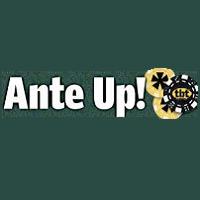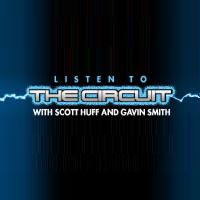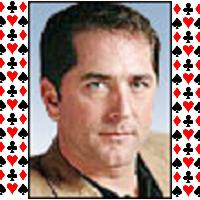Okay, single file . . . everyone line up against the far wall there. What follows are my top five poker podcasts (6-10 appeared in my
previous post). I should note that there are other podcasts out there, of course, that I've yet to hear. Also, my preferences are dictated (predictably) by my own interest in small stakes games, so someone with other interests may have different favorites. In any event, here goes:
 1. Card Club on Lord Admiral Radio
1. Card Club on Lord Admiral Radio The longest-running poker podcast is also the best, in my opinion. Card Club began in November 2004 as a weekly podcast devoted to chronicling the adventures of a private poker club in Toronto. Soon the show expanded to include reports from Vegas, book reviews, listener contributions, and more, growing from a 25-30 minute show to what now generally approaches a hour’s worth of quality listening. The hosts,
“Cincinnati” Sean and
Brent Stacks, are smart, witty students of poker who (too) modestly describe themselves as low-limit hacks. They occasionally invite other members of Lord Admiral for “roundtable” discussions about hands or other poker-related topics. Last summer a listener, Ray or “Columbo” (of
pokerwannabe.blogspot.com), began contributing his own “Columbo’s One-Minute Mysteries.” Each mystery features Columbo puzzling over a particular crisis point in a poker hand, at which time he invites the listener to consider “What would you do?” The Lord Admirals ponder their responses, then we get to hear a second, concluding part (either during the same show or the following week). The OMM’s are smartly constructed and made more humorous by the clever insertion of Peter Falk soundbites into each mystery. (They begin around episode 40 -- check ’em out.) That a listener has now become part of the regular program this way highlights one of the show’s greatest strengths -- its inclusiveness. “Cincy” Sean often repeats his desire for the show to participate in and help foster a larger “community” of poker players, a kind of common ground where small stakes players can meet and share ideas and experiences. The show entirely succeeds in realizing this purpose. I recall a “roundtable” from an early episode when the club discussed a Hold ’em hand that had been emailed in by a listener. As the discussion began, Sean mentioned that the hand came from a $0.50/$1.00 limit game, but quickly added that the stakes weren’t as important as the listener’s question about his play. Short-stacked players like myself appreciate such disclaimers. Many of us will never rise much further than the lower limits. For us poker will probably always be a much-valued recreational activity (and not a full-time profession). If you fall into this category of player, a show like Card Club will add significantly to your enjoyment of the game. Perhaps begin with the later shows, but do work your way back as the earlier ones -- even the first dozen -- remain good listening.
Rating: a pair of aces; always play 2. Ante Up!
2. Ante Up!This Florida-based weekly podcast started approximately one year ago with hosts Christopher Cosenza (an editor at
Tampa Bay Times) and Scott Long (an editor at the
St. Petersburg Times also who writes a column called "Bet On It" for the
TBT) having conversations about poker of modest length (15-20 minutes) and unexceptional depth. The early episodes are all fine, but none are terribly impressive. However, after 20 weeks or so the pair really began to hit their stride and shows became lengthier and much more engaging. The occasional appearance of avuncular Mike Fasso (a columnist for the
St. Petersburg Times) also adds a lot to the proceedings. Cosenza and Long play all games at lower limits (online and live) and thus much of what they have to say is relevant and enjoyable to small stakes grinders such as myself. Episodes are organized around a particular topic or theme (e.g., “Pot Odds,” “First time in a casino,” “Check raising,” “Poker Books We’re Reading”). They’ve also devoted shows to games other than Hold ’em (Omaha, 7-Card Stud, Razz). Pick it up around the 20th episode or so and enjoy.
Rating: ace-king suited; play often, particularly from late position 3. CardPlayer’s The Circuit
3. CardPlayer’s The Circuit Last December
CardPlayer magazine began producing these podcasts at the Five Diamond World Poker Classic, essentially daily reports from the event though augmented considerably by interviews and strategy discussions. Since then,
CardPlayer has continued to produce four or five lengthy (usually around an hour-long) episodes from each major circuit event. The show was originally co-hosted by Scott Huff (an amateur player) and Mike “the Mouth” Matusow, and the earliest episodes (from the Five Diamond, the Caribbean Poker Adventure, and the Gold Strike World Poker Open) feature several moments where Huff successfully tames Matusow into an entertaining and informative contributor. Things deterioriate a bit after that, with Matusow frequently coming on and complaining endlessly about his misfortune at whatever tournament they happen to be covering, his self-loathing and/or whining often obscuring interviews with guests. (Even Huff’s attempts to toss the Mouth into “Radio Jail” -- i.e., turning off his mic -- seem not to have worked.) Matusow has now apparently moved on, with pros Joe Sebok and Gavin Smith having assumed co-hosting duties with Huff. This trio interacts very effectively -- all three are smart and articulate about poker and at times can be funny as hell. Huff’s perspective probably matches that of most of the show’s listeners (a low-limit grinder with more online than brick-and-mortar experience), and thus provides a nice way of interacting with Sebok, Smith, and the pros who come on the show. Huff frequently asks questions you or I would want asked (about strategy, moving up limits, bankroll considerations, etc.). The show can also be very entertaining. For some humor highlights, check out the episode featuring Steve Dannenman and the “New Cut Crew” from the WPT Winter Open, the one featuring Phil “
I can dodge bullets baby” Hellmuth from the Five-Star World Poker Classic, or the one with Haralabos Voulgaris at the Mirage (which
I’ve mentioned before). Great stuff.
Rating: ace-king offsuit; plenty of reasons to play 4. Rounders, the Poker Show
4. Rounders, the Poker Show Rounders is a Canadian podcast that’s associated with an AM station out of Vancouver. The hosts Mike Johnson and Adam Schwartz are both smart and engaging, although their sometimes-overly-rapid delivery (esp. Johnson’s) is a clear tell that you’re listening to sports radio. The weekly, 45-minute show focuses primarily on the pros, with nearly all the top names having been interviewed at some point during the thirteen months or so it has been produced. There’s also a good deal of discussion about what’s happening in Vegas. So while you may now and then hear some strategy talk, the podcast is generally geared in other directions. The hosts are players as well, with Schwartz playing in some of the bigger money games and Johnson playing lower limits and online tourneys. So they will occasionally relate their own experiences, and since they are both good talkers the discussions are generally fairly compelling. The show is well-produced and always sounds great, and a lot of the older interviews are not so time-bound as to be less interesting today. If you’re interested in particular personalities, go through the archives and find their interviews among the 50+ episodes produced thus far. (Unlike some of the interviewers at the bottom of the list, these two do a fine job letting the guests speak their minds.)
Rating: ace-queen offsuit; mostly play but can be let go now and then 5. Phil Gordon’s 2005 WSOP podcasts
5. Phil Gordon’s 2005 WSOP podcasts Last summer professional player and former co-host of
Celebrity Poker Showdown Phil Gordon produced one of the more popular poker podcasts of the year during the
World Series of Poker. From June 3rd to July 17th, he posted podcasts on an almost daily basis detailing his experiences playing multiple events at the WSOP. During breaks Gordon would record brief rundowns of how he had fared during the previous level, often narrating interesting hands or other notable events that had occurred. He’d also usually interview at least one other pro per episode (they run from 5-10 minutes up to a half hour or more). In the end, every episode includes something of interest, including genuinely helpful tournament strategy tips (from himself and from others). Gordon is a pretty likable guy who’s clearly knowledgable about poker. He also can be pretty damn funny at times, too. I found these sometime late last summer and had listened to all 29 of them within a couple of weeks. I’m sure I’m not alone in hoping he does something similar again this year.
Rating: pocket jacks; a favorite over most of the fieldOkay, move it on out. You've seen 'em all . . . now, check 'em out yer selves and tell me what you think.
Images: Card Club on Lord Admiral Radio, Ante Up!, CardPlayer’s The Circuit, Rounders, the Poker Show, Expert Insight (Phil Gordon).
Labels: *the rumble, Ante Up, Card Club on Lord Admiral Radio, Phil Gordon, podcasts, Rounders the Poker Show, The Circuit, The Poker Edge



























